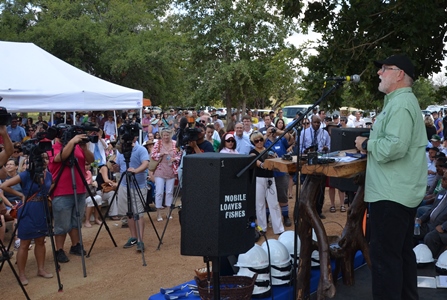
By Elizabeth McGuire
Alan Graham is a fan of saying Yes. That single word plays into his entire approach to life and has become a driving factor in the development of what is now considered a revolutionary approach to addressing homelessness in Austin.
Graham spent decades in real estate development before teaming up his entrepreneurial mind and his compassionate heart with the creation of Mobile Loaves & Fishes (MLF), a nonprofit that delivers food and clothing to people living on the streets. Starting with a single catering truck, the organization has grown to include 16 trucks and more than 18,000 volunteers in 5 cities and 4 states. To date, MLF has served nearly 3.9 million meals to the homeless.
His latest endeavor is Community First, a $12 million plan to build a 27-acre master-planned community that will provide affordable, sustainable housing and a supportive environment for the chronically homeless in Central Texas.
In person, 59-year-old Graham is an intriguing mix of saint, student and scholar. He’s a savvy entrepreneur with a selfless attitude. Wearing what seems to be part of his everyday uniform, he sports a baseball hat and a large cross on a thin chain around his neck. He immediately comes across as affable, relaxed and funny. He quotes Dirty Harry movies as easily as he quotes The Bible.
For someone with a schedule as busy as his, Graham appears to have all the time in the world for us. It’s part of saying yes…and as we soon learn, we are all beneficiaries of that favorite word.
You started Mobile Loaves & Fishes in 1998 with friends. Tell us about making that move from the business world to running MLF full-time…
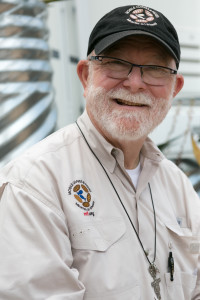 It was a spiritual journey that I liken to two rheostats on a wall–the knobs that turn lights up and down. One knob was my real estate development world…and it was very bright. A “Go make all the money in the world” type thing. There was a faith light that basically didn’t exist. You could barely see a glimmer of light. When Tricia and I starting to have kids in the late 80s, we thought one of the good moral buffet tables we could go to would be church, and we jumped into that track.
It was a spiritual journey that I liken to two rheostats on a wall–the knobs that turn lights up and down. One knob was my real estate development world…and it was very bright. A “Go make all the money in the world” type thing. There was a faith light that basically didn’t exist. You could barely see a glimmer of light. When Tricia and I starting to have kids in the late 80s, we thought one of the good moral buffet tables we could go to would be church, and we jumped into that track.
In 1996 I got invited to go on a retreat at my church, given by men for men. Had I known it was going to be a retreat where men get together and hold hands and pray and hug I never would have gone. It turned out to be exactly that deal. I had a very, very powerful spiritual experience that connected my heart with my head, and I began to adopt a philosophy that I call “Just Say Yes.” So if someone asks me to do something, doesn’t matter who they are…if my calendar will allow it, I will go do it.
For example I just got an email from a homeless guy wanting a tour of our Community First village. You can either make a case that I should be taking millionaires and billionaires out there because it takes millions to do what we’re doing, or look at it in a completely different way: God is calling me to take this guy, homeless and probably a crack addict, out there to show him a place he may live someday, and to develop that personal, intimate relationship.
So that Just Say Yes philosophy clicked on that rheostat, where I could begin to see that light. When the vision for MLF came along in 1998, those rheostats really began to move in opposition. By 2003, I was full time in ministry and had backed out of the real estate world 1,000 percent.
Is there a common denominator that your jobs have shared?
It’s incredible how the skill sets I learned and utilized in my professional life apply today. I’m a real estate developer building a $12 million RV community. And you just don’t do those kinds of things unless you have the skill set.
There’s a saying that God doesn’t call the equipped; he equips the called. So I was called into an area of service–the chronically homeless population of Austin–that I had no knowledge about. He called me into that space and began to equip me in a number of ways.
All of my business career, education, Leadership Austin, all of that, has led to where we are sitting today.
What drew you to homelessness as your cause?
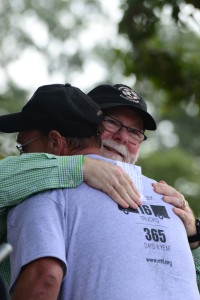 It was absolutely a calling. I would say I’m attracted to people who have had very deep battles. I grew up in a family where my mother was profoundly mentally ill and institutionalized a lot prior to her death. I just got a phone call today from my younger brother who I hadn’t heard from in weeks. He’s a bipolar crack addict. There’s something about all of it that made me gravitate toward this cause. In a lot of ways God knew I wouldn’t walk away from it.
It was absolutely a calling. I would say I’m attracted to people who have had very deep battles. I grew up in a family where my mother was profoundly mentally ill and institutionalized a lot prior to her death. I just got a phone call today from my younger brother who I hadn’t heard from in weeks. He’s a bipolar crack addict. There’s something about all of it that made me gravitate toward this cause. In a lot of ways God knew I wouldn’t walk away from it.
I call myself a finisher. There’s something about that bull-headedness…being thrown under the bus and getting up and shaking it off. All of the things we’ve encountered…God knew I would be able to withstand many, many setbacks.
You seem to have unique leadership skills in that you can see the big picture and also attend to the small details…
What’s a real leader? You’re not there when you’re 30 or 35. Most people don’t start maturing until their late 40s. I just turned 59. There are things you learn along the way because you made some mistakes.
I do think I have that 60,000 ft. viewpoint. I also think I know what needs to be done on the ground. But I’m not in the weeds on everything. I had to make sure the organization had people who had strength in the weeds.
You and I must recognize our limitations. We are all limited in so many different ways, and when we recognize our limitations it opens the door to allow people into that space to fill those voids so those things we are really good at it can be accentuated.
Did you have specific goals when you started the food truck program? Can you tell us about how the services evolved from food trucks to Community First?
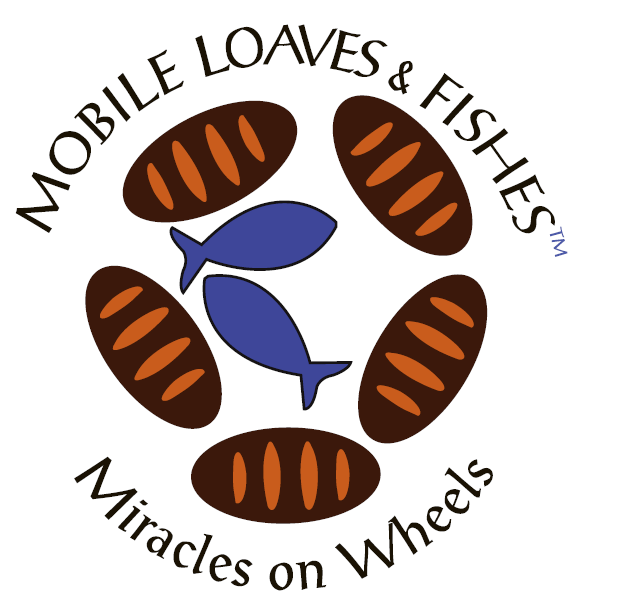 As soon as we bought our first truck, it’s been a hit. You can dissect why that is…
As soon as we bought our first truck, it’s been a hit. You can dissect why that is…
Currently in most cities, if a homeless person wants to be fed, they are herded to a soup kitchen and served through a window without much human interaction. The food unit that comes out may not be what they want.
Our trucks go where the homeless are. The person being served and the person serving are on the same side of the counter, so it demands a one-on-one interaction. The other thing that happens on the food truck: you are making choices about what you’re going to eat based on what’s on the truck. The choices aren’t as varied, but they are choices, and that meets an important human need.
What happens in that hospitality environment is that you and I begin to develop a relationship. And we are leveraging things like food and toiletries as the conduit to connecting people human-to-human and heart-to-heart. That turned out to be a very powerful mechanism.
In 2002, I developed another idea–what we now call a Street Retreat. We take a group of people on a one-on-one retreat between you and God (whatever God means to you). We take 20 to 30 people out on the streets of Austin. I have slept in every conceivable location with the homeless: shelters, parking lots, urban camps, parks, wherever. You begin to develop an even deeper, more intimate relationship with the homeless and begin to understand why they are in the situation they are in.
One thing we’ve learned is that the absolute common denominator in everyone’s life is that there has been a profound and catastrophic loss of family. That all of these things, like drug addiction, mental health issues, affordable housing and living wages, already exist in our family or families we know. Almost everyone is battling things that like this, but somehow there is a safety net, called a family, that prevents them from falling through the cracks and from living under the girders of I-35.
We think homelessness as an issue of poverty, but it’s a relational thing.
That’s why we say housing will never solve homelessness but community will. The Community First idea is being built based upon years and years of spending time with people and learning why they are in the situation they’re in.
So the idea of Community First is to recreate community and reestablish strong relationships so residents can support each other?
We believe that human beings are anthropologically and Biblically called to be settled, rooted in a place we can call home. When we are settled to the best we can be settled, it allows us to use the gifts we have that are inherent to each of us.
When we are cultivating, instead of begging, we feel good about the things we do and we begin to care about things outside ourselves. I don’t have to worry about where my daily meal comes from or where to get my shelter. I can begin to care for something else. The Community First village is predicated on that. It’s got a farming operation in the middle of it…chickens, rabbits, goats, honeybees, fish…and these are things that humans can interact with, care for, harvest, consume and share.
We believe that homelessness is a disconnection from family, which leads to a disconnection from self and from community. On the outside looking in, you can see how the homeless population is on the fringe of community…despised and outcast. So the goal is to change that outlook.
What’s the most rewarding part of your work?
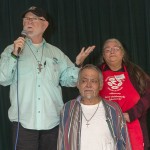 I love the transformation that I witness in other people. Our vision statement is that we empower communities into a lifetime or service with the homeless. As part of our corporate philosophy, our first goal is to transform how you view the stereotype of the homeless. That’s the most rewarding component. There’s a stereotype out there about homeless people, and in reality they are wonderful human beings who are broken, like many of us.
I love the transformation that I witness in other people. Our vision statement is that we empower communities into a lifetime or service with the homeless. As part of our corporate philosophy, our first goal is to transform how you view the stereotype of the homeless. That’s the most rewarding component. There’s a stereotype out there about homeless people, and in reality they are wonderful human beings who are broken, like many of us.
And this city…there’s no other place I would rather live in and be a part of than Austin, Texas. I’m looking forward to the work we do having such a big impact that this becomes the city that finally figured out a way to mitigate homelessness.
You joined the Essential Class of 1995 (3 years before starting MLF). Where was your career at the time and what was your experience like?
We were probably coming out of the 80s real estate bust. By 1995 the market was returning in a pretty robust way. I had actually moved my organization as a real estate organization to a services company in order to survive that period of time. And I found myself during that time in 1994/95 running an organization that I hated every minute of it. Because I wasn’t doing what I really wanted to do. Leadership Austin was phenomenal. I was in a class of maybe 50, and in that class there were 48 very liberal people and two very conservative people, and that was Gerald Daugherty and me. There was some struggling at times, philosophically, because you feel like you’re on this page and everyone else is on another…but in that process I developed some deep relationships.
Any advice for Austin leaders?
I believe that MLF is on the verge of having a ginormous impact on an issue in our city, and we are pretty singularly focused. I think what happens to a lot of civic leaders is that they try to tackle a myriad of things: transportation, environment, economic development. And they are never going to be good at any of those things unless they focus. I would say, find that one civic component that drives you to really want to serve and go out and dedicate your life to that piece.
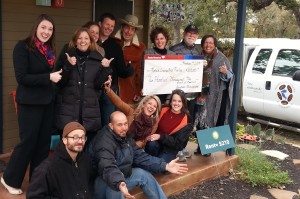 You have so many talented people out there and if you’re serving on the board of this one year and then move over to another one the next…first the environment, now the arts…I just don’t think they get much done. They get a lot of plaques on their wall. I would rather see that person dedicate their level of energy into something that could really, over time, have a big impact on our city.
You have so many talented people out there and if you’re serving on the board of this one year and then move over to another one the next…first the environment, now the arts…I just don’t think they get much done. They get a lot of plaques on their wall. I would rather see that person dedicate their level of energy into something that could really, over time, have a big impact on our city.
And I think we have to be patient, because change takes a long time.
Anything else you’d like to share about MLF or leadership in general?
John Maxwell wrote a book called “The Five Levels of Leadership” that’s a principle that I buy into.
Level 1 is positional leadership: as in, “I am the CEO of Mobile Loaves & Fishes.” The 2nd level is permission: The people who are in a role of following must grant me permission in order for me to be a great leader. The 3rd level is production: People want to work for someone who is working hard. The 4th level is trying to inspire others into the strong leadership role, by offering opportunities and educating people. The 5th level is that you actually raise someone up to take your place. That’s the hardest deal in the world. We live in this competitive world, where I might be willing to bring you in or near but not all the way. But I’m looking forward to that. The greatest leaders are the ones who aren’t threatened by others.
